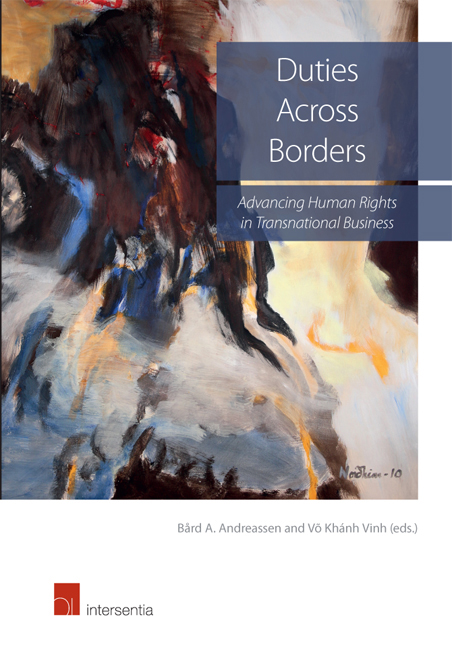Book contents
- Frontmatter
- Preface
- Contents
- List of Authors
- List of Figures and Tables
- Introduction. Business’ Duties Across Borders: The New Human Rights Frontier
- Part I. Conceptual Developments
- Part II Contextual Issues
- Part III Sites Of Regulation
- Chapter 10 Human Rights and Business. An Assessment of the Responsibility of the State in Vietnam
- Chapter 11 Investment Treaties and Human Rights. Reflections from Mining in Latin America
- Chapter 12 Beyond State Duty and Corporate Responsibility. Human Rights in Industrial Zones in Vietnam
- Chapter 13 The Application of the UN ‘Protect, Respect and Remedy’ Framework to State-Owned Enterprises. The Case of the State Oil Company SOCAR in Azerbaijan
Chapter 14 - The Invisible Minority. Status of the ‘Differently Able’ People in the Export Industries in India
from Part III - Sites Of Regulation
Published online by Cambridge University Press: 21 September 2018
- Frontmatter
- Preface
- Contents
- List of Authors
- List of Figures and Tables
- Introduction. Business’ Duties Across Borders: The New Human Rights Frontier
- Part I. Conceptual Developments
- Part II Contextual Issues
- Part III Sites Of Regulation
- Chapter 10 Human Rights and Business. An Assessment of the Responsibility of the State in Vietnam
- Chapter 11 Investment Treaties and Human Rights. Reflections from Mining in Latin America
- Chapter 12 Beyond State Duty and Corporate Responsibility. Human Rights in Industrial Zones in Vietnam
- Chapter 13 The Application of the UN ‘Protect, Respect and Remedy’ Framework to State-Owned Enterprises. The Case of the State Oil Company SOCAR in Azerbaijan
Summary
INTRODUCTION
The great author and activist Helen Adams Keller once said that ‘science may have found a cure for most evils; but it has found no remedy for the worst of them all – the apathy of human beings’. While estimates vary, according to the United Nations, around one billion people live with disabilities globally – they are the world's largest minority. The World Health Organisation estimated more than six hundred million people across the globe live with disabilities of various types due to chronic diseases, injuries, violence, infectious diseases, malnutrition, and other causes related to poverty. According to the Government of India's 2001 census record, India has more than 21 million disabled persons.
India has ratified the UN Convention on the Rights of Persons with Disabilities of 2007 which prohibits ‘discrimination in workplace’ and ensures ‘reasonable accommodation’. Therefore, India has an obligation to work for the rights of persons with disabilities (PWDs). In spite of that they are subjected to multiple deprivations with limited access to basic services, including education, employment, rehabilitation facilities, etc. Widespread social stigma plays a major role in hindering their normal social and economic life. This is the reason often given by corporation managers for not hiring PWDs in the workforce in labour intensive industries, e.g. in garment companies. Empirical data indicate that only 0.5 per cent of people working in the public sector are disabled. The numbers of those employed within the private sector also remains miniscule, and has only a recorded 0.3 per cent, while multinationals have 0.05 per cent.
Yet, with the rise of globalisation, the influence of CSR is rapidly increasing in India. Among corporations, there is a general increase in awareness to include disabled people in their workforce, especially with the government's plea to implement the Persons with Disabilities (Equal Opportunities, Protection of Rights and Full Participation) Act of 1995. Chapple and Moon highlight that social initiatives of businesses in India mostly consist of involvement in community development, education, health and disability. Despite the introduction of a new labour code of conduct and request for social audits, international codes like Fair Labor Association, Fair Wear Foundation, OHSAS, Business Social Compliance Initiative, and the Social Accountability Standard (SA 8000) do not refer to disability rights as such, but often include clauses of ‘discrimination’ and ‘harassment’ that may apply to persons with disabilities.
- Type
- Chapter
- Information
- Duties Across BordersAdvancing Human Rights in Transnational Business, pp. 323 - 341Publisher: IntersentiaPrint publication year: 2016

